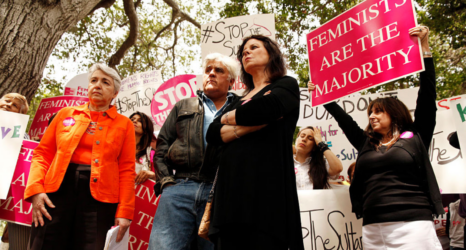How can we fight misinformation and end the legacy of fake abortion centers for good?

In the 1980s, my mom went undercover for Planned Parenthood to expose crisis pregnancy centers (CPCs) that masqueraded as abortion clinics.
My mom’s work led to the New York attorney general forcing more transparency on these clinics.
Despite my mother’s best efforts, up to 4,000 CPCs still exist in the U.S. today. For perspective, that’s more than double the amount of abortion-providing facilities in operation today. CPCs are notorious for providing largely false or misleading medical information and rarely have a doctor or a nurse on staff. These dubious facilities are propped up by federal programs from Trump-era changes to Title X and state governments. In fact, 13 states have spent $495 million funding these faux clinics since 2010.
By allowing fake women’s health clinics to operate with little to no oversight or regulation, we’re using our tax dollars to spread medical misinformation to women at their most vulnerable moments. Google and Yelp have already taken steps to address the misinformation they spread, but those steps aren’t enough.
Crisis pregnancy centers are tools in the war on women, and they should not exist. They certainly shouldn’t have federal funding. With the end of Roe, the anti-choice movement is only increasing support for these fake women’s health clinics. Dangerously, without HIPAA protections, the clinics can store personal health information that can be used to sue or prosecute abortion providers or patients.
As women lose access to care, accurate health information has never been more critical or time sensitive. When abortions are restricted to the few weeks after conception, women don’t have the luxury of time wasted by a fake clinic.
These are some of the things my mom taught me as a young adult, things she herself had learned from her grandpa, a medical director at Planned Parenthood. This work runs in my blood.

After Roe was overturned, I continued my mom’s work to fight misinformation spread by crisis pregnancy centers with my team by putting up billboards near the same fake abortion clinics my mom worked to expose, in red states across America. The billboards offered messages of support and links to my company’s emergency contraception product, which we’ve continued to offer for free—to the tune of 10,000 doses.
But that’s only 10,000 people, at most. How can we fight misinformation and end the legacy of fake abortion centers for good?
There are a few steps that the government can and should take to fight misinformation and protect the health of women everywhere, and prevent my future daughter from having to be the fourth generation in my family to fight misinformation spread by CPCs:
- Investing in medically accurate sex education in our public schools.
- Requiring fake women’s health clinics to disclose the services they do and do not offer and whether they have medical staff at their facilities.
- Invoking consumer protection laws to prevent false advertising or deceptive practices by CPCs.
U.S. democracy is at a dangerous inflection point—from the demise of abortion rights, to a lack of pay equity and parental leave, to skyrocketing maternal mortality, and attacks on trans health. Left unchecked, these crises will lead to wider gaps in political participation and representation. For 50 years, Ms. has been forging feminist journalism—reporting, rebelling and truth-telling from the front-lines, championing the Equal Rights Amendment, and centering the stories of those most impacted. With all that’s at stake for equality, we are redoubling our commitment for the next 50 years. In turn, we need your help, Support Ms. today with a donation—any amount that is meaningful to you. For as little as $5 each month, you’ll receive the print magazine along with our e-newsletters, action alerts, and invitations to Ms. Studios events and podcasts. We are grateful for your loyalty and ferocity.
Up next:





